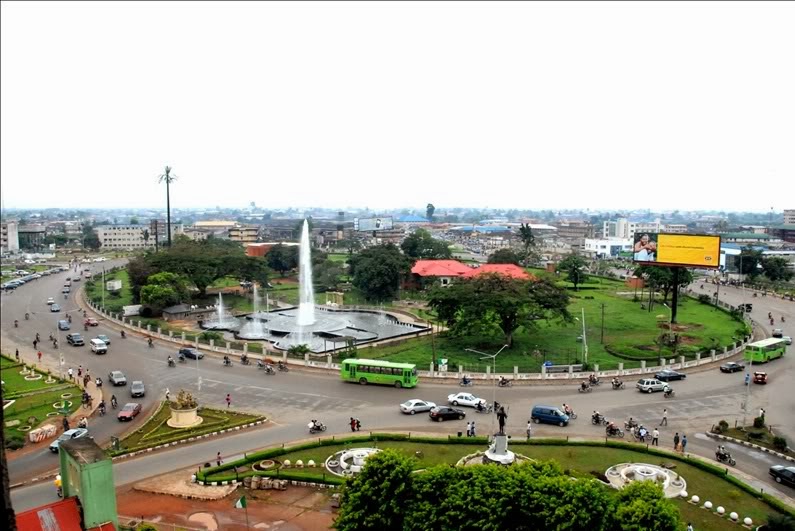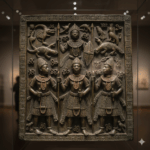Kupitia eneo maarufu la King's Square linalojulikana kama barabara ya pete katika jiji la Benin, Nigeria. Inayoizunguka ni Jumba la Makumbusho la Kitaifa la Benin ambalo huhifadhi baadhi ya sanaa na ufundi bora zaidi za watu wa Bini na ambalo pia hutumika kama kivutio cha watalii kwa wageni wanaotaka kujua zaidi kuhusu ufalme mkuu wa zamani wa Benin.
Hapa ndipo Mauaji ya Benin yalipotokea mwaka wa 1897 - ambayo yalisababisha kuanguka kwa Dola ya Benin na ufundi mkubwa na wa ajabu uliporwa kama nyara (mmoja wao ni mkuu wa Malkia Idia) na askari wa Uingereza. Nyingi za kazi hizi za ufundi na kazi za sanaa ziliuzwa kwa nchi zingine, huku zingine zikiwa zimehifadhiwa katika Jumba la Makumbusho la Kitaifa la Uingereza (ingawa juhudi zinaendelea ili kupata kurudi kwao).
Hadithi hiyo inapoendelea, inasimulia juu ya mfalme mkuu na mwenye nguvu wa Benin anayejulikana kama Oba Ovoramwen Nogbaisi, mtawala wa ufalme mkuu wa Benin wakati huo mmoja wa falme zenye nguvu na ustawi katika eneo la Afrika Magharibi.
Huko nyuma, ufalme wa Benin kwa kawaida ulifanya biashara ya watumwa, pembe za ndovu, pilipili na mawese na Wareno mapema kama 1485, na katika kilele cha mamlaka yao, mnamo 1853 Waingereza waliwasiliana na Wabini (watu wa Benin) kufanya biashara ya pilipili, mafuta ya mawese, nguo, na pembe za ndovu.
Fakta kutoka Benin-massakeren

Kutokana na uwezo wake wa kiuchumi na kijeshi, Benin iliendesha shughuli zake za kibiashara kwa uhuru katika eneo lake na haikuwekwa chini ya amri za ufalme au himaya nyingine yoyote, hata Uingereza.
Naam, baada ya mfululizo wa mafanikio ya biashara, makamu wa balozi wa Uingereza, Henry Galway, alitembelea Benin kwa nia ya kunyakua ufalme kupitia mkataba. Aliwasilisha huu unaoitwa mkataba wa "biashara na urafiki" kwa Oba ambao walikuwa na shaka kuuhusu na Uingereza pia. Oba hata hivyo alitia saini mkataba huo akikubali kukomesha utumwa na kafara za kibinadamu nchini Benin (jambo ambalo lilikuwa ni jambo la kawaida wakati huo), lakini baadaye Oba Ovoramwen alitambua kwamba mkataba huo ulikuwa ni mbinu tu ya kuiingiza Benin katika Milki ya Uingereza na hivyo akawakataza watu wake kufanya biashara na Waingereza na kuwazuia (Waingereza) wasiingie Benin.
Hili na msururu wa matukio yalisababisha wafanyabiashara wa Uingereza kuzunguka eneo hilo kukasirishwa na uamuzi wa Oba Ovoramwen, kwani hatua zilizochukuliwa zilionekana kuwa mbaya kwa biashara yao ya kibiashara na pia ukiukaji wa makubaliano yao ya amani yaliyotiwa saini na baadaye kuwashawishi wakuu wa Uingereza kupindua Oba na kutwaa ufalme wake.
Mnamo Novemba 1896, kaimu Balozi Mkuu James Robert Philips alikwenda Benin na "wanajeshi wake wa kirafiki" ambao walikuwa na mawakala wawili wa kibiashara, maofisa wawili wa Niger Coast Protectorate, afisa wa afya na askari 250 wa Kiafrika waliojifanya kuwa wapagazi waliotuma barua kwa Oba ikisema kwamba anakuja kwa "ziara ya kirafiki" kujadili biashara na amani kutoka kwa Waingereza (wakati akingojea ruhusa kutoka kwa Waingereza).
Kwa bahati mbaya kwa Phillips, alifika wakati wa tamasha linaloendelea la Igue - tamasha la Igue awali lilisherehekewa kama ibada ya kufanya upya nguvu za kichawi za Oba. Wakati wa msimu wa ibada ya Igue, Oba hairuhusiwi kuwa mbele ya watu wowote wasio asili. licha ya kuonywa na sehemu ndogo ya jeshi la Benin kuhusu tamasha linaloendelea na matokeo yake, Philips aliziba sikio (unajua jinsi watu wanavyotaka kuona kile kinachotokea gizani katika filamu za kutisha?) na akaendelea na ziara yake.
Kwa bahati mbaya, aliuawa pamoja na askari wake. Ni Waingereza wawili pekee walionusurika katika shambulio hilo. Hii ndio leo inajulikana kama mwanzo wa Mauaji ya Benin ya 1897.
Baada ya kusikia hivyo, serikali ya Uingereza ililipiza kisasi kwa kutuma askari wenye silaha za kutosha (waliojumuisha hasa Waafrika) kushambulia na kuharibu Milki ya Benin.
Mashambulio ya mabomu ya Benin yalianza tarehe 9 Februari 1897. Ingawaje vikosi vya Benin vilijaribu kurudisha nyuma shambulio hilo (mtindo wa komando), lakini silaha zao ambazo hasa zilikuwa na mapanga, mikuki na mishale hazikuweza kuwiana na bunduki na mizinga ya kisasa ya Waingereza. Kila nyumba katika ufalme ilipitiwa, watu waliuawa bila kujali jinsia, umri na hali. Na cha kufurahisha, sehemu ya Kiafrika ya wanajeshi wa Uingereza ndio waliopigana zaidi, wakati wanajeshi wa Uingereza walikaa nyuma ya bunduki na mizinga.
Muda mfupi baada ya kuharibu ufalme, Oba Ovoramwen alikamatwa na Balozi Mkuu wa Uingereza Ralph Moor na kutupwa mbele ya sheria za Uingereza.
Oba Ovoramwen Nogbaisi alifikishwa mahakamani na kupatikana na hatia. Kisha aliondolewa madarakani na, pamoja na wake zake wawili, wakahamishwa hadi Calabar ambako alifariki Januari 1914. Baada ya Benin kuangamizwa kwa mafanikio, wanajeshi wa Uingereza walipora ufalme huo na kusafirisha vitu vyake vya thamani na kazi za sanaa. Viatu hivyo vilipigwa mnada ili kulipia gharama za msafara huo.
Walakini, nyingi za sanaa hizi na kazi za sanaa bado zinaishi katika makumbusho ya kigeni. Hii ilichangia kuanguka kwa Dola kuu ya Benin.
Vyovyote vile, watu wengi leo hawajui jinsi jiji hili lilivyotokea leo. Jiji la Benin leo ni jiji la kibiashara zaidi sasa. Kwa hivyo kuna kwamba, Dola kuu ya Benin, moja ya falme zenye nguvu na tajiri zaidi katika Afrika Magharibi,
Kila kitu kinafikia mwisho.
Machapisho yanayohusiana
-
Mambo Tisa Kuhusu Simba
Huku filamu kama vile "The Lion King" zikivuma kwenye jumba la sinema, watu wengi wamebaki na hisia...
-
Mambo 11 ya Kuvutia Kuhusu Kenya
Kwa kuzingatia jinsi Kenya ilivyo ya ajabu, haizungumzwi vya kutosha. Nchi hii tofauti…
-
Shaba za Benin: Sanaa, wizi na urejeshaji
Urithi Uliowaka Katika moyo wa Jimbo la Edo la sasa, Nigeria, jumba la kifalme…


